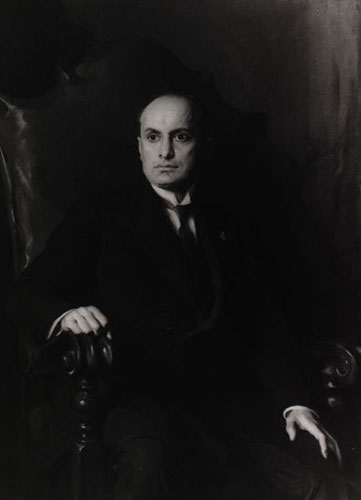*Image Credit: Wikimedia Commons Dovia di Predappio is a small town in northeastern Italy located deep in the heart of Emilia-Romagna. On July 29, 1883, a boy by the name of Benito Amilcare Andrea Mussolini came into the world in the community to a blacksmith father and schoolteacher mother. Over the next five decades before his assassination near the end of World War II, he would put his hometown on the map as he ascended to the head of the Italian government and carried out an aggressive expansion campaign as part of the Axis Powers. The oldest of three children, as a youth Mussolini became interested in the cause of Italian nationalism. Rebellious from the start, he would end up being kicked out of one boarding school for violent acts against his classmates, a teacher and Mass congregants before graduating from another in 1901. Though trained for a career in education, Mussolini moved to Switzerland the following year, taking a job as a mason before plugging into a group of Italian Socialists living there. Working as a journalist, he gained a reputation for fiery speeches to local workers’ unions and encouraging violence in order to force demands be met – something he served jail time for before being deported to Italy. After bouncing back and forth between the Swiss city of Lausanne and his Italian home, Mussolini eventually accepted an amnesty for his desertion and volunteered to serve in the army for two years. Despite having been a journalist in Switzerland, he put his primary education to use and returned to the classroom as an instructor. For perhaps the last time in his life, things were relatively quiet. Leaving his homeland again in early 1909, he began to rise in the Socialist Party from Trento, then part of Austria-Hungary. Writing for and editing the party’s newspaper, not to mention creating works of his own, he settled in Forli the following year. Influenced by the work of Friedrich Nietzche, Mussolini began to critique the Marxist ideology and, after declaring his support for Italian involvement in World War I (and loudly criticizing those who did not), his membership in the party was revoked. In 1914, he started his own newspaper, Il Popolo d’Italia, and formed a political group to advance his beliefs on the necessity of intervention in the conflict, gaining support by utilizing nationalist rhetoric – arguing, for example, that Italians under the rule of other kings, like those in his former home of Trento, should rise up to overthrow the royal governments and rejoin their home nation. The Fasci Rivoluzionari d’Azione Internazionalista, his fledgling political party, openly battled with the socialists. As a demonstration of his commitment, he joined the Italian army to fight in the conflict, being discharged in August 1917 after suffering injuries due to an accidental mortar explosion. Returning to Il Popolo, he continued to assert the end of socialist doctrine. Two years later, he began to work to prove himself correct. Early in 1919, he organized the Fasci Italiani di Combattimento in Milan – an “Italian Combat Squad” intent on advancing fascism and restoring the nation to the heights of its Roman past. Believing the size of a country’s population could do more than anything to give it military might, Mussolini constantly encouraged women to have as many children as possible. (In his mind, a 60-million-strong population would be enough to conquer any other army.) Three and a half years later, Mussolini felt the time to act had arrived. Late in October of 1922, Mussolini’s Blackshirts – squads of Italian veterans purported to help clean up the streets – marched on Rome to oust Prime Minister Luigi Facta. King Victor Emmanuel III, understanding the writing on the wall after seeing the ranks of the Fascists explode in just two years, encouraged the new Prime Minister Mussolini to give the government a fresh start. The result would be the dismantling of any blocks to the placement of total power in the Prime Minister’s hands. Upon first glance, Mussolini found little in common with German leader Adolf Hitler – in fact, he was angry the Nazi chief had ordered the murder of the Austrofascist Englebert Dollfuss. As Hitler gained larger swathes of territory, Mussolini’s belief changed. The French and British, to his reckoning, were now on the decline and the time for Italy to rise on the world stage had come. In May 1939, he accepted the German plan for a military alliance just weeks after ordering Italian troops into Albania. A year later, Italy would officially enter World War II on the side of the Axis. At first, Mussolini’s armies achieved marked success in North Africa and Eastern Europe, the Italian fortunes turned. The dictator’s health began to suffer and, despite his desire to quit politics altogether, he quickly became a pawn of the Nazi movement. With the Allies rolling back the German line late in April 1945, Mussolini was captured by communists while attempting to sneak across the border into Switzerland and board a flight to Spain with his mistress. Unable to resist the inevitable, the former Italian leader and his 14-person entourage were executed the next morning. In order to discourage other fascists, the bodies were hung in the Piazzale Loreto of Milan, where the public spat upon and threw rocks at them for days.
July 29, 1883 CE – Benito Mussolini Born
*Image Credit: Wikimedia Commons Dovia di Predappio is a small town in northeastern Italy located deep in the heart of Emilia-Romagna. On July 29, 1883, a boy by the name…
602
